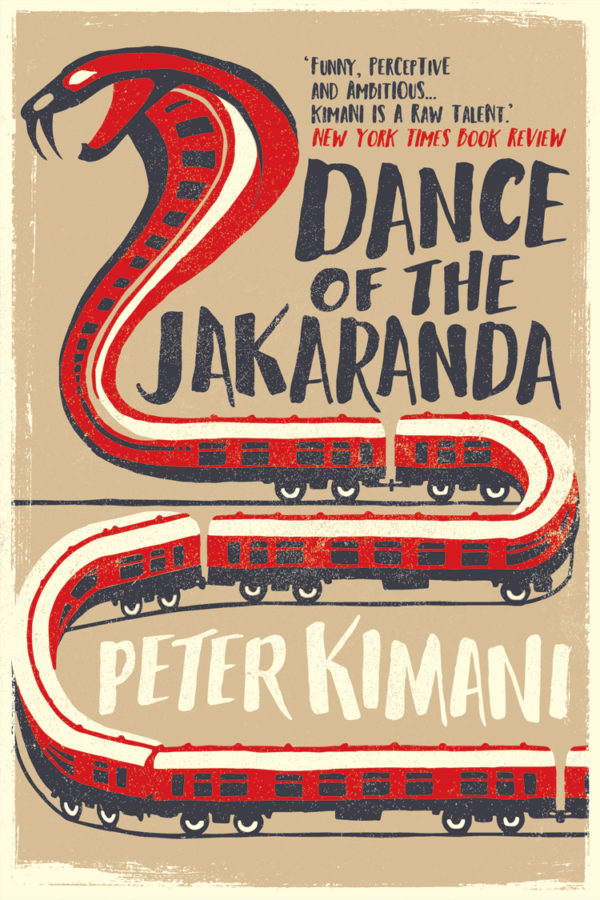
Saqi Books is releasing the UK edition of Peter Kimani’s Dance of the Jakaranda, originally published last year by Akashic Books.
Set in 1960s Kenya, “the novel traces the lives and loves of three men—preacher Richard Turnbull, the colonial administrator Ian McDonald, and Indian technician Babu Salim—whose lives intersect when they are implicated in the controversial birth of a child. Years later, when Babu’s grandson, Rajan—who ekes out a living by singing Babu’s epic tales of the railway’s construction—accidentally kisses a mysterious stranger in a dark nightclub, the encounter provides the spark to illuminate the three men’s shared, murky past.”
The book is being praised for the fresh perspective it brings to the question of race in African communities. Critics are also raving about Kimani’s style. Publisher’s Weekly praises the book’s “evocative voice,” calling it “a standout debut.” The New York Times says the story is “so funny, so perceptive, so subversive and so sly.”
FYI: Kimani will be at Tottenham Court Road Waterstones. Stop by to say hi! Click HERE for event details.
Enjoy the teaser below.
Buy Book| HERE
***
In that year, the glowworms in the marshes were replaced by lightbulbs, villagers were roused out of their hamlets by a massive rumbling that many mistook for seismic shifts of the earth. These were not uncommon occurrences—locals experienced earthquakes across the Rift Valley so often they even had an explanation for it. They said it was God taking a walk in His universe. They believed this without needing to see it, but on that day the villagers saw the source of the noise as well. It was a monstrous, snakelike creature whose black head, erect like a cobra’s, pulled rusty brown boxes and slithered down the savanna, coughing spasmodically as it emitted blue-black smoke. The villagers clasped their hands and wailed: Yu kiini! Come and see the strips of iron that those strange men planted seasons earlier—which, left undisturbed, had grown into a monster gliding through the land.
The gigantic snake was a train and the year was 1901, an age when white men were still discovering the world for their kings and queens in faraway lands. So when the railway superintendent, or simply Master as he was known to many, peered out the window of his rst-class cabin that misty morning, his mind did not register the dazzled villagers who dropped their hoes and took off, or led their herds away from the grazing elds in sheer terror of the strange creature cutting through their land. Neither did Master share in the tamasha booming from across the coaches where British, Indian, and African workers—all in their respective compartments—were celebrating the train’s maiden voyage. Instead, Master was absorbed by the landscape that looked remarkably different from how he remembered it from his previous trip.
The mass of water appeared to have grown from a pond into a large lake. Maybe his eyes were playing tricks on him; or maybe after crawling through that very same land on either donkey or zebra, his lofty perch on the train now afforded him a very different view. To the left, a spring spewed hot water, the vapor casting clouds of woolly nothingness above it. One of these should be named for Sally, Master thought—the idea eliciting a mélange of soreness and softness that always came with the memories of his English wife, now estranged for four years. She was the reason he was looking forward to returning to England. A ship was waiting at the port of Mombasa, some ve hundred miles away, where the rail construction had begun. The railroad tracks ended at the head of what he had named Port Victoria, memorializing the lake there with the same name, in honor of the Queen of England. So the rail that started by the shores of the Indian Ocean now cut through the hinterland to the shores of Lake Victoria. This was the mission that had brought him to the British East Africa Protectorate, and it had now been accomplished. He had been discharged with full honor, the cable from London said, echoing the military jargon that had regulated his life for twenty-three years. The cable also said a letter with full details of his release had been dispatched on SS Britannia, the vessel that would then deliver him home to England. Master suppressed a smile at the thought, and further subverted the thought by pretending to scratch his pate, whose receding hairline merged with his forehead to form what looked like a small crater.
“Happy are the pure at heart,” Reverend Richard Turnbull, sitting beside Master, said over the rattling sounds of the train: Kukuru-kakara, kukuru-kakara. They held different sections of the shiny pole that served as passenger support, as though they were experienced pole dancers, though their bums never touched.
Master nodded and smiled ruefully but said nothing, retreating to the cemetery of his mind where memories unfurled. He wanted to absorb as much as he could from the land, a sudden burst of emotion clogging his throat. It was hard to imagine the space they were gliding through with such swiftness had been a blistering crawl that had taken them four years to complete. four years in the wilderness. What had partly kept him going was the anticipation of the triumphant maiden ride. That moment had nally arrived, but Master felt somewhat de ated, the memories of his dif cult past keeping him from fully enjoying the celebrations.
As if reading his mind, Reverend Turnbull bellowed, “Rejoice!” as the train approached a new township, which, like many other settlements they had encountered, seemed to have sprouted up out of the steps of the train station. On either side of the compartment, Indian and African workers, traveling in second and third class, made music from anything they could lay their hands on, rattling bottles with spoons, clapping, ululating. The walls that separated the different races were still up, just as they had been through the years of construction. The different racial groups, Master had written in one of his dispatches to London, remained separate like the rail tracks. Yet the rail was the product of their collective efforts—of black and brown and white hands.
The African and Indian workers on the train danced jubilantly and Reverend Turnbull joined them, nodding his head and waving excitedly. But Master remained unmoved through the razzmatazz. Still unable to savor the moment, he was still distracted, lost in his thoughts. He found it strange that he was starting to miss the land before even leaving it. He had anticipated this moment for four years, but now that it had come, the longing that he’d harbored zzled into knots of anxiety—not just about the future and Sally’s place in his scheme of things, but also about the present that would soon become the past.
Trying to rid himself of his anxiety, Master glanced outside. “That’s where we left that Indian bastard,” he said to Reverend Turnbull, his fore nger arching into a crooked arrow that pointed to a spot where rows of mud-and-wattle rondavels stood. The walls were plastered with white clay and the shingles on the roofs were aligned neatly, like rows of corn.
“The runaway father?”
“Yes, the f—the bastard,” Master replied, checking himself just in time before cursing in front of a man of God. “We have all come short of the glory of God,” Reverend
Turnbull said quietly, glancing outside, the rondavels almost out of sight. “I’m glad I took the baby into my care.”
“Was our suspicion borne out?”
“What suspicion?”
“That it was his child?”
Reverend Turnbull shook his head quietly.
Master turned to face him. “What does that mean?”
“No.”
“What do you mean?”
“Nothing.”
“Why?”
“That’s a secret only known to the child’s mother.” Master opened his mouth, then sighed and shrugged.
“Was the child Indian or Caucasian?”
“What’s the difference?”
“Hair? Nose? I thought it was pretty obvious . . .” “Nothing in life is that obvious.”
“So, are you con rming the child was Indian or
Caucasian?”
“What does it matter?”
“It does.”
“Why?”
Master opened his mouth, ashed a wan smile.
“Because…”
“What’s done is done,” Reverend Turnbull said. “I’m
now the girl’s father. I will raise her as my own.”
Master opened his mouth again but kept quiet. He had
burdened the man of God with enough secrets.
Both men returned to gazing out the window. Their arms were tangled around the shiny pole and their faces nearly touched as they craned their necks to peek outside—their bums still as far from each other as possible—stretched out at awkward angles so that they resembled ducks. The lake was almost out of view, only a sliver of light visible where it stood, and the clouds above the hot water spring appeared
to have shifted.
“Reverend,” Master said, facing him, “I know your Bible
says heaven is somewhere else, but I think it must be close by.”
Reverend Turnbull smiled, loosened his collar, and responded, “I’m afraid so.”









COMMENTS -
Reader Interactions